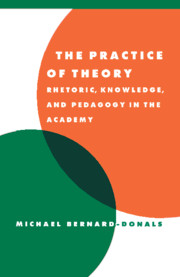Book contents
- Frontmatter
- Contents
- Acknowledgments
- Introduction
- 1 Reconsidering Gorgias, Phaedrus, and Platonic rhetoric
- 2 Why Aristotle's notion of rhetoric and science is important for contemporary critical practice
- 3 A (rhetorical) reading of the human sciences: toward antifoundationalism
- 4 Rorty and the mirror of nature: hermeneutics and the possibility of social change
- 5 Louise Phelps and Theory: toward a human science disciplined by practical wisdom
- 6 Liberatory pedagogy, conceptual knowledge: toward a practical wisdom disciplined by scientific observation
- 7 Toward a materialist rhetoric: writing the conditions of the incommensurable
- Works cited
- Index
7 - Toward a materialist rhetoric: writing the conditions of the incommensurable
Published online by Cambridge University Press: 04 August 2010
- Frontmatter
- Contents
- Acknowledgments
- Introduction
- 1 Reconsidering Gorgias, Phaedrus, and Platonic rhetoric
- 2 Why Aristotle's notion of rhetoric and science is important for contemporary critical practice
- 3 A (rhetorical) reading of the human sciences: toward antifoundationalism
- 4 Rorty and the mirror of nature: hermeneutics and the possibility of social change
- 5 Louise Phelps and Theory: toward a human science disciplined by practical wisdom
- 6 Liberatory pedagogy, conceptual knowledge: toward a practical wisdom disciplined by scientific observation
- 7 Toward a materialist rhetoric: writing the conditions of the incommensurable
- Works cited
- Index
Summary
With the publication of Richard Rorty's Philosophy and the Mirror of Nature, antifoundationalist thinkers could legitimately claim that, with the overthrow of epistemology, hermeneutic analysis could give us the best and most useful information about “the world.” Our understanding of the world is created – linguistically inscribed in a process of “redescription” – rather than “discovered” scientifically. So, the antifoundational object of analysis is the vocabulary used by people trying to describe their surroundings. It is useless trying to analyze the surroundings themselves, because you can never escape their mediated nature: they are always descriptions, and as such all we have to go on are the linguistic schemes that the various interlocutors have at their disposal. What this thesis fails to account for, though, is the object of knowledge, the object of all the descriptions that Rorty sees as so important. We may be able to reconcile competing normal descriptions (that is, abnormal discourse) by finding a “third vocabulary” with which to make descriptions, but the fact remains that there is something that is being described and is (one would think at least in part) responsible for the difference of opinion. Moreover, redescribing something is not necessarily going to change it, nor is redescription necessarily an adequate tool for analysis.
The rioting that occurred in Los Angeles during the last days of April and the first days of May 1992 after the announcement in the Rodney King police-beating case appears to me to be a perfect example of an event (or, if you prefer, object of knowledge) that cries out for some kind of “redescription.”
- Type
- Chapter
- Information
- The Practice of TheoryRhetoric, Knowledge, and Pedagogy in the Academy, pp. 213 - 238Publisher: Cambridge University PressPrint publication year: 1998



